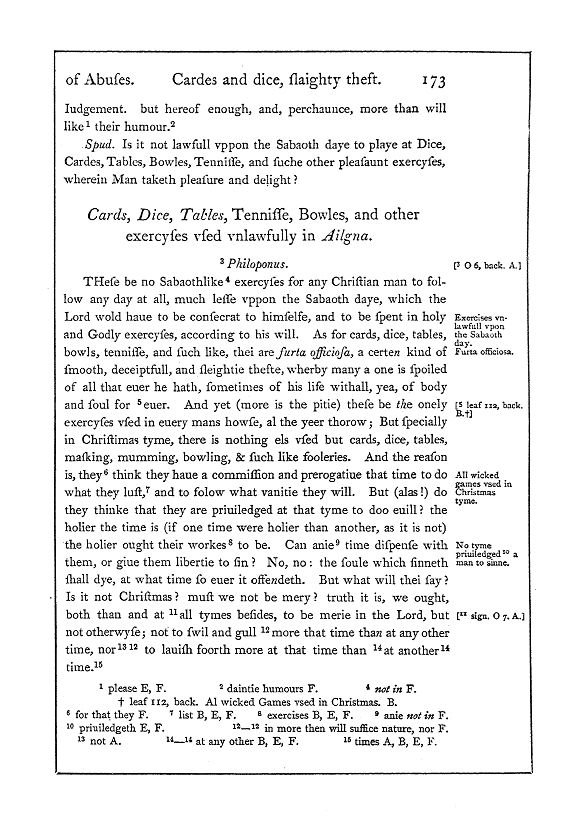nn
n
n
n
n Following the Reformation in England, Protestantsnviewed anything that was even vaguely ‘Popish’ with extreme suspicion. One suchnsuspicion concerned anything relating to the Catholic Mass, which includednChrist’s Mass – Christmas. The Puritans preferred to refer to it as Christ-Tideninstead but the whole festival was regarded as an accumulation of Romishnsuperstitions.
n
n
n
 |
| Phillip Stubbes – Anatomie of Abuses – 1583 |
n
n
n
nAs early as 1583, the pamphleteer Phillip Stubbes was railingnagainst the festival in his Anatomie of Abuses. He writes,
n
n
n
n“…fpeciallynin Chriftimas tyme, there is nothing els ufed but cards, dice, tables, mafking,nmumming, bowling, and such like fooleries … what mafking and mumming! wherbynrobberie, whordome, murther, and what no[t] is committed! What dicing andncarding, what eating and drinking, what banqueting and feafting is then ufednmore than in all the yeere befydes! to the great difhonor of God, andnimpoverifhing of the realme.”n
n
n
n
n
| Self-indulgent and Wasteful Carousing |
n
n
n
nThe merry-making was seen as wasteful andnself-indulgent, and so obviously sinful, and a redundant remnant of the immoralnpractices of the Catholic faith. From 1642 on, Ordinances were passed banningnthe performance of plays and in June 1647, an Ordinance was passed innParliament that banned the keeping of Holy Days and festivals, includingnChristmas, Easter and Whitsuntide, replacing them with a day of recreation onnthe second Tuesday of each month.
n
n
n
n “Forasmuch as the Feasts of The Nativity of Christ, Easter, Whitsuntide, andnother Festivals, commonly called Holy-days, have beennheretofore superstitiously used and observed: Be it Ordained, by the Lords andnCommons in Parliament assembled, That the said Feasts of The Nativity of Christ, Easter, and Whitsuntide, and all othernFestival-days commonly called Holy-days, be no longernobserved as Festivals or Holidays, within this Kingdom of England and Dominion of Wales.”n
n
n
n
n
| Parliament bans Christmas |
n
n
n
nThe idea was thatnSundays, the Lord’s Sabbath, were to be observed instead and that churches werento close whilst markets were to be held and shops to be opened on the formernfeast days instead. However, it didn’t quite work out as planned. The shopsnthat did open were attacked and their wares scattered into the streets. Therenwere riots in Ipswich, Oxford and Canterbury, where the mayor was pummelled andnhis windows broken, and thousands of men declared that if their Christmas wasntaken away, they would return the King to the throne. But Parliament persistednand when it was felt that the celebration of Christmas was making ansurreptitious return, on December 24th 1652, it was resolved
n
n
n
n“… thatnthe Markets be kept To-morrow, being the 25th Day of December: And thatnthe Lord Mayor, and Sheriffs of London and Middlesex, and thenJustices of Peace for the City of Westminster, and Liberties thereof, dontake care, that all such Persons as shall open their Shops on that Day, benprotected from Wrong or Violence, and the Offenders punished … That nonObservation shall be had on the 25th Day of December, commonlyncalled Christmas Day, nor any Solemnity used or exercised innChurches, upon that Day, in respect thereof.”n
n
n
n
n
| Christmas Banned Again |
n
n
n
nSoldiers broke into churchesnon Christmas Days and arrested people at musket-point; John Evelyn, the diarist,nreports his own arrest for attending a church service in 1657.
n
n
n
| Old Christmas |
n
n
n
nThe traditionalnChristmas foods were also banned, with plum pudding and mincemeat being especiallyntargeted. Mince pies, it was rumoured, were supposed to be representations ofnthe Christ Child in his manger and thus irredeemably Popish. The ‘Water Poet’,nJohn Taylor, complained
n
n
n
n“ … to roast a sirloin of beef, to touch a collar ofnbrawn, to take a pie, to put a plum in the pottage pot, to burn a great candle,nor to lay one block the more in the lire for your sake, Master Christmas, isnenough to make a man to be suspected and taken for a Christian, for which henshall be apprehended for committing high Parliament Treason and mightynmalignancy.”n
n
n
nThis didn’t stop some confusion – in 1652, a Puritan preacher,nHugh Peters, was accused by church authorities of preaching against thencelebration of Christmas from his pulpit and then going home and having twonmince pies for his supper. The Puritans, it has to be admitted, had the best ofnmotives – they were seeking to ‘purify’ the abuses of the Christian faith byneradicating superstitious practices but I tend to agree with H L Mencken, whondefined Puritanism as
n
n
n
n“… the haunting fear that someone, somehow, may benhappy.”n
n
n
n
n
| A Suspicious Puritan |
n
n
n
nWith the Restoration of the monarchy in 1660, Christmas returned tonbeing openly celebrated, although it had changed. The masques and the revelrynof the Lords of Misrule had gone and it was left to the Victorians to reinventnChristmas in the form that we now recognise it. I’ll come to that on anothernday.
nnn
n
n
nnn